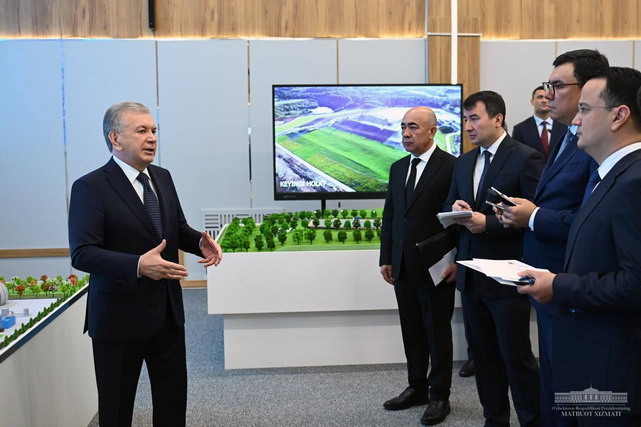
Uzbekistan advances projects for environmental sustainability
Uzbekistan advances projects for environmental sustainability
Tashkent, Uzbekistan (UzDaily.com) — President Shavkat Mirziyoyev reviewed a presentation of projects aimed at waste recycling and energy generation from household waste.
Uzbekistan produces around 14 million tons of waste annually, yet only 4-5% is recycled. This contributes to the emission of over 7 million tons of greenhouse gases and 43,000 tons of toxic filtrates from landfills. Effective waste recycling can not only reduce environmental harm but also generate economic benefits.
In response, the Ministry of Ecology, Environmental Protection, and Climate Change, together with foreign investors, has developed several initiatives. The plans include building eight waste-to-energy plants and capturing landfill gas at the Akhangaran landfill, with an investment of around US$1.3 billion.
For instance, through a US$350 million direct investment from China’s CAMC Engineering, two plants will be built in Andijan and Tashkent regions, capable of processing 4,000 tons of waste daily and generating 630 million kilowatt-hours of electricity annually.
Additionally, China’s Shanghai SUS Environment plans to invest US$310 million to construct two plants in Samarkand and Kashkadarya regions. These plants will process 3,000 tons of waste daily and generate 480 million kilowatt-hours of electricity each year.
The UAE’s Tadweer Group will allocate US$200 million to build a plant in Bukhara and Navoi regions, processing 1,500 tons of waste per day and generating 363 million kilowatt-hours of electricity annually.
A project with South Korea’s Sejin company involves establishing a plant to generate electricity from landfill gas in the Akhangaran district. This plant is expected to have a capacity of 16 megawatts, with a US$55 million investment.
The implementation of these projects will ensure the efficient use of solid waste, allowing for the incineration of over 4.7 million tons of waste per year and producing 2.1 billion kilowatt-hours of electricity, worth approximately US$97 million. This will save 152 million cubic meters of natural gas and reduce greenhouse gas emissions by 2.4 million tons, creating 1,200 new jobs.
These projects, scheduled for completion between 2025 and 2027, will be carried out in regions such as Andijan, Bukhara, Jizzakh, Kashkadarya, Navoi, Namangan, Samarkand, Syrdarya, Ferghana, and the city of Tashkent.
President Mirziyoyev emphasized the social significance of these initiatives, noting their crucial impact not only on waste management but also on environmental protection, public health, and energy stability. Properly organizing waste collection and recycling will improve the environmental balance and drive societal changes.
Officials were instructed to ensure these projects serve as models for future initiatives and to explore increasing their numbers across various regions. Investors and manufacturers were also urged to focus on the energy supply for their facilities, with new construction materials and organic fertilizer plants ideally located near waste recycling centers.
Additionally, a "roadmap" is to be developed to expand and balance the implementation of similar projects nationwide.
Uzbekistan is gradually advancing in this field. A presidential decree on September 26, 2024, established the Waste Management and Circular Economy Development Agency. This agency will focus on introducing modern methods for collecting, sorting, recycling, and disposing of waste. Developing the circular economy will improve environmental conditions, sanitation, and reduce the incidence of hazardous diseases. Waste will be converted into alternative energy, raw materials, and organic fertilizers, with plans to create eco-industrial zones at landfills.
#Shavkat Mirziyoyev